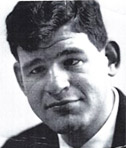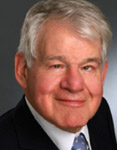Bill Josephson Has the Last Word
Bill Josephson, who was the General Counsel at the agency, sent me this email to correct some of the information I had included in my blogs about the establishment of the Peace Corps. When the Kennedy administration took over the White House in 1961, Josephson was at the International Cooperation Administration, an agency within the Department of State that had principal responsibility for foreign aid programs under the Mutual Security Acts of the 1950s. He had joined the ICA’s General Counsel’s office in the Fall of 1959 as Far East Regional Counsel. About the same time, Warren W. Wiggins, a career ICA economist (all but thesis from the Harvard Economics Department) became the Deputy Director of Far East Regional Programs. Wiggins had served in Norway, the Philippines and Bolivia in the late 1940s and throughout the 1950s. Josephson and Wiggins bonded. Having been bombarded by the New Frontiersmen with questions about a proposed Peace Corps, they decided to write and distribute what later became to be called The Towering Task.
Bill recently sent me an email to correct some of the information I had included in the blogs I wrote about the establishment of the agency. Here’s with Bill has to say.
•

Bill Josephson, 1961 photo by Rowland Scherman
These stories have been told and retold so many times that errors inevitably creep in.
I only want to correct the two Ralph Dungan meetings.
I attended both of them as the sole representative of the Peace Corps. Sarge was on his round-the-world trip. I do not know where Warren was, but he was not at either meeting. Moyers had not yet joined the Peace Corps. I was Special Assistant to the Director and Acting General Counsel. Maybe Mary Ann Orlando told me to go, maybe.
At the first meeting, Ralph was in the chair. Also present were David Bell, the Budget Director, and Henry Labouisse, the Director of the International Cooperation Administration soon to become the head of the Agency for International Development, ICA’s successor (Labouisse was not successful, and at some point David Bell succeeded him). Ralph, purporting to act on behalf of President Kennedy, announced that the Peace Corps would become part of AID.
When I returned to the Peace Corps, Warren and I communicated Ralph’s decision to Sarge, who was in India. We received a telegram from the Ambassador, Ken Galbraith, on behalf of Sarge telling us to contact the Vice President. Warren and I called Bill Moyers, who was still working for LBJ, and briefed him.
My recollection is that the second Ralph Dungan meeting was held the next day. Again, David Bell and Labouisse were present. The Vice President was also present, and this was the first time I met him. We were supposed to meet with President Kennedy, but that never happened. While we were waiting, the Vice President hectored Bell and Labouisse about the importance of Peace Corps independence and autonomy overseas from the State Department and ICA/AID. LBJ was a big man, and he had a leaning in hectoring style. The phrase, “pulled them up by their ears,” was mine, in my report of the meeting.
We never got to meet the President. That night, LBJ met with the President and persuaded him that the Peace Corps should be independent. Warren and I learned of this meeting from Moyers, not from Dungan. I called Dungan, told Ralph that I looked forward to working with him and offered to come to his office a smoke the peace pipe. Ralph told me in no uncertain terms that the Peace Corps was on its own and should not come to The White House for help when it got into trouble.
 Many years later, I saw Ralph at a Kennedy Library event, and we hugged each other. I have a wonderful picture of Ralph and myself together at that event.
Many years later, I saw Ralph at a Kennedy Library event, and we hugged each other. I have a wonderful picture of Ralph and myself together at that event.
Fast forward many years. When I was PC Country Director in Nepal, leading a talented bi-national staff, it was an honor to attend the weekly Country Team meetings at the Embassy representing an independent PC. We could speak freely and cooperate, as appropriate, when we had the opportunity. For example, I assisted our military attaché with PCV engineers when he was getting a temporary bridge flown in after a flood cut off the capital city. I believe our Ambassador valued this independence, because in all embassies there is a tendency for group think. Further, the PCVs felt loyalty, above all, to their host agencies, as health workers, teachers, ag. extension workers, etc.